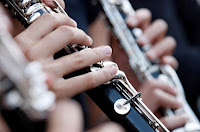If you do an Internet search on “children music lesson
benefits” you will find a myriad of reasons why young people should pursue an
instrument. At the very least, learning an instrument helps round out a young
person’s general experiences, helps him better understand music that is heard
every day, promotes discipline and persistence, and helps with motor skills.
Gifted children have the potential to gain a lot from music lessons.
When do you know if your child is ready for music
lessons?
First, your young person should be able to
- follow instructions
- count
- recite the alphabet
- concentrate for 30 minutes
Parents need to be
- ready for a long-term commitment, including weekly trips to the teacher’s studio and supervising at-home practice
- willing to stick with lessons for 6-12 months to evaluate the child’s progress
How do you choose the right instrument for your child?
- Parents should expose young children to a wide variety of sounds. Kids often gravitate toward musical instruments they’ve been around. Family concerts performed by orchestras are good venues for exposure.
- Wind and brass instruments can be a poor match for a young child’s small lips.
- Some people believe that the piano offers a good foundation.
- Don’t get caught up in stereotypes of boys playing big, noisy instruments and girls playing softer, more delicate instruments.
- Respect your child’s choice.
- Be practical. What kind of instruction is available in your area and how far are you willing to drive?
How much will it cost?
Costs of instruments can vary widely.
- Decent upright piano--$1,000
- Violin--$300
- Flute--$1,000
Many band instruments can be rented from music stores for
$20-30/month, with the option to buy.
A very cheap instrument can actually be harder to play.
Lessons will probably run $30-60/hour, but may be a lot more
in some areas of the country. A good teacher will be much more skilled at
instructing your child.
How do you find the right teacher?
The first teacher your child has is essential in setting the
right tone and establishing good playing habits, so research this well.
You and your youngster may want to first observe a lesson to
make certain you are comfortable with the way the teacher interacts with
students.
To find a teacher, check out the Music Teachers NationalAssociation (MTNA)
for a list of questions to ask. On the same website, you will find a box to
fill out to find a certified music teacher in your area. However, don’t limit
your search for a music teacher to just the MTNA website. Music stores often
have a list of recommended teachers to share. School music teachers may also
have recommendations.

Carol, good post, thank you. I taught private flute lessons for roughly 15 years, and am about to start up my studio again after a few years away. A quality beginner flute is usually a lot less than $1000, and a good used instrument can be found for $500-$750. I do warn against finding an instrument at a yard sale and spending a fortune getting it in playable condition; I've seen students spend enough doing that they could have purchased a professional model.
ReplyDeleteAs for matching an instrument to lips, a good teacher can help parents and students make that decision. The youngest student I ever had was 5, though now I'll only take students as young as 7; had nothing to do with ability to play and everything to do with attention span. : )